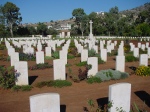I was inspired to think about this seemingly random link after reading a poem. The poem is called “Alive together” and it is by Lisel Mueller. The poem begins thus:
Speaking of marvels, I am alive
together with you, when I might have been
alive with anyone under the sun,
The poet goes on to imagine being a woman in a different time, married to different men, the idea of who we are being both random and minutely specific to a multitude of histories. I like this poem and I have recently been reading ‘Crete – The Battle and the Resistance”’ by Anthony Beevor. It is a very good account of a fearsome battle for control of the island in Greece during the Second World War, told from many sides of the story, the Germans, the New Zealanders, the British and the Cretans. My Dad was in the 5th field Regiment, a gunner, in the New Zealand 22nd Battalion defending the airport at Maleme, the point at which strategically the battle was lost, when it should have been won.
If, they say, General Freyberg had not been so hell-bent on the idea of a seaborne invasion… if Colonel Andrew (according to Beevor), “had gone forward before nightfall to observe the coastal trip and the western slopes of Hill 107…” … so many ifs. I imagine too, if they’d all had I phones, perhaps a few texts to and fro with some pictures attached… but then too, it seems Freyberg was very concerned about revealing to the Germans that the Brits had cracked their code, and so I guess I phones can easily be hacked . And too, imagine instead of young men dropping from the sky (like Icarus) in their parachutes, if instead, the Germans had used drones. The account of hand to hand combat between the Germans, local Cretans and the Kiwis is fierce and brutal. It seems that the Geneva convention did not apply as far as the Cretans were concerned. They were civilians defending their own patch. Oddly, the Germans imagined that the Kiwi soldiers would not fire upon them as they descended in their multi-coloured parachutes. But of course they did. And I have it first hand from my Dad, how extraordinary it was, to be firing at such easy targets, but too, how sickening. I read in Beevor’s account, how the gunners were told to aim low at the falling body because of the rapid descent, thus ensuring an accurate hit.

But in spite of this, the battle was won by the Germans, although they suffered extraordinary casualties. The paratroopers were young men (the German elite), some as young as sixteen and thousands were slaughtered in the first two days of the battle. So, what brings me to me Mapua? What is my connection? It is really rather random as I mention at the start (but then you see, don’t you, how random all of our histories really are).
I was reading about the Battle of Crete, perched on the seafront at Ruby Bay (a hop skip and a jump from Mapua where I drank my morning coffee and had these thoughts) and I realised that if the 5th Field Regiment had held the airfield, I may not have existed. The defence of Maleme would have required a further battle – my Dad instead of retreating might have died in the ensuing violence – or so I told myself under the hot Tasman sun. That he survived to be taken POW and then shipped on cattle trains to Poland to spend four years as a POW – not to mention the subsequent 600 mile march in snow at the end of the war … well, that is neither here nor there, because this is what happened and so I know he survived all of this. But too, at each step along the way, there are a multitude of ifs to consider.
And as a result of my father’s war experience, I am fascinated with Greece, with the Battle of Crete, and too, I am ‘alive together with you, and you, and you (my family, my friends, my readers)… and there’s something both thrilling and fateful about this very being alive. If the chance came, would you change your life, be an entirely different person? As a child I used to look at people and try to imagine what it might be like to be them and then be terrified that I had wished too hard and what if I did become them and I didn’t like it and then I couldn’t get me back. Whatever befalls us, we may wish it had not, but do we ever really want not to be ourselves? Perhaps some people do (and here one can imagine a child in the slums of Mumbai). I am currently reading ‘Behind the beautiful forevers’ by Katherine Boo. Yes, perhaps if I was atop a rubbish dump, scavenging for a living, I may well be happy for my wish to be granted… but thankfully in my own fortunate life … it is enough to be ‘alive and together’ …
the poem ends thus:
alive with our lively children
who — but for endless ifs —
might have missed out on being alive
together with marvels and follies
and longings and lies and wishes
and error and humor and mercy
and journeys and voices and faces
and colors and summers and mornings
and knowledge and tears and chance.
Isn’t it just a grand poem? I have Diana Gilliland Wright of Firesteel to thank for her blog which alerted me to this beautiful poem and of course, if you wish to read the entire poem, click this link to Firesteel.







